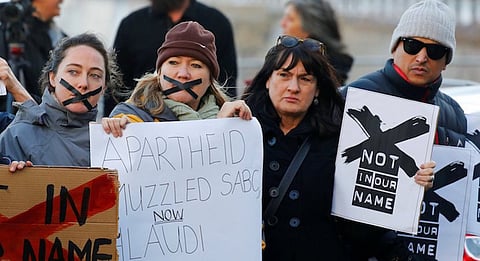Pressly: Not just ‘patsy’ SABC – also stand against ‘doctored’ private news
The focus has been squarely on the South African Broadcasting Corporation, and fair play. The chief operator, Hlaudi Motsoeneng has pushed the 'anti-constitutional' button, and is not only telling the 'good' news but has also suspended the 'bad' news crew. And while Donwald Pressly makes note of this, he looks at similar shenanigans that have occurred in the private media space. And says South Africans need to fight both the private and public media houses who threaten the country's media freedom. – Stuart Lowman
By Donwald Pressly*
The South African Broadcasting Corporation is clearly going through a crisis. It is a crisis arising out of ideological differences between its management – which is there to play President Jacob Zuma's bidding let us face it – and other factions of the ruling African National Congress. The latter are at odds over how the public broadcaster is being managed and broadcasting policy – which is supposed to articulate the public interest – is articulated.
The ANC Youth League, always a little to the Left extreme of the ruling party, backs Hlaudi Motsoeneng, the COO of the SABC. Motsoeneng is the patsy of the President, quite frankly. The parliamentary party, as articulated by Jackson Mthembu, has a different view. The basic argument is that the SABC is not following government policy. That in itself is also a problem, but let us not go there. Motsoeneng has banned the broadcaster from covering events involving violence. So property burning which has become part of the culture of resistance in South Africa's black townships to lack of delivery, is blackened out. The burning of Pretoria (Tshwane municipality) recently and the thug-like violence is ignored. It is covered by rival TV and radio stations (and international broadcasters of course). Motsoeneng believes that if something like this is not given air time, it hasn't happened. It is so much like the apartheid approach to broadcasting that it makes one want to vomit. Of course, it is borne out of the ideological allegiance of far too many South Africans to the Soviet approach to state control of the mind.
A number of SABC journalists have stood up to the censorship, to their credit. The most notable are Jimi Matthews, acting SABC group CEO and Lukhanyo Calata, son of the late Fort Calata (one of the famous Cradock Four) who died at the hands of the apartheid security police in the Eastern Cape in the 1980s. Matthews resigned in protest. The Calatas are – a bit like the Mandelas – one of the names of anti-apartheid resistance. So when Calata speaks out about mismanagement and censorship at the SABC, where he works as a parliamentary journalist in Cape Town, one needs to sit up and take notice. Calata has been charged with contravening SABC rules. Last Friday he was part of a demonstration outside the SABC building in Sea Point. Six other SABC employees have been targeted for voicing concerns about censorship: Busisiwe Ntuli, Krivani Pillay, Jacques Steenkamp, Thandeka Gqubule, Foeta Krige, and Suna Venter. Quite frankly these people are heroes.
My old friend Mzimkulu Malunga, former managing director of BDFM (Business Day and Financial Mail), is also a victim of chicanery at a media group. That was some four years ago. He resigned after being suspended. It emerged he had a "fraught relationship" with Avusa (now Times Media Group which is best known for the Sunday Times) management. It was apparently about falling circulations and he was blamed for it. But this week he has been an outspoken critic of the media on Facebook, arguing that journalists don't write about the retrenchment of 65 journalists at his old group. Basically he accused media establishments of ignoring private media shenanigans.
https://twitter.com/SureKamhunga/status/752386330282295296
Malunga may have a point. There is a difference, however. Times Media is a private company, unlike the public broadcaster. However, the media is a different creature to most private businesses – it involves the public at large and is arguably, accountable to the public at large. The retrenchment of journalists is an issue which is downplayed, probably because the private media groups are too sensitive to write about their own problems. Whether retrenchments amount to censorship is a moot point, but Malunga has a point. The mainsteam media, whether public or private, tend to ignore the implications of wide-scale re-engineering of media groups – which in the case of the South African media seems to be a never-ending process. This is highly disruptive to good journalism at best. At worst it amounts to censorship.
South Africans need to fight all threats to media freedom in South Africa, whether it is at the public broadcaster or the private media groups. The juniorisation and cheapening of journalism is also a threat to press freedom and freedom of expression. Malunga has a valid argument that this attack on journalists by the private media establishments – something which the Times Media Group is not alone in articulating – should also be fought against. We should be demonstrating against the private media groups when they behave badly, as many journalists did outside of the SABC headquarters in Johannesburg and Cape Town last week.
- Donwald Pressly, Editor of Cape Messenger

